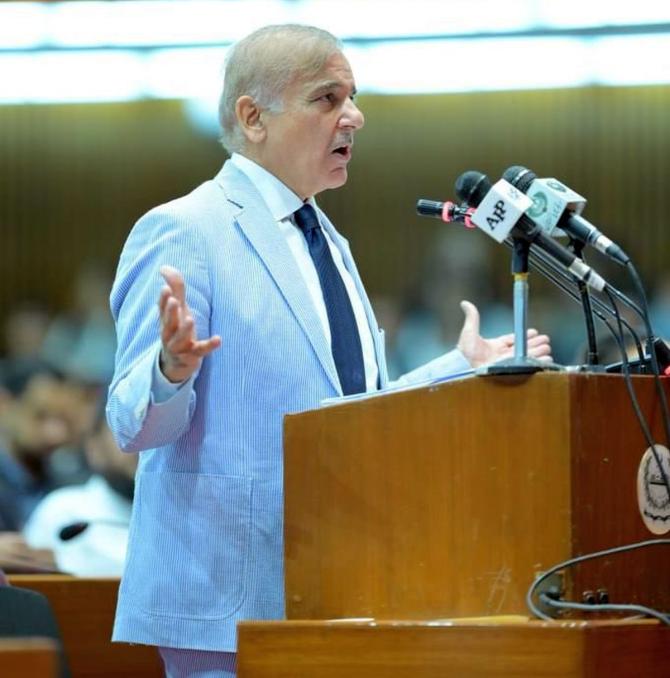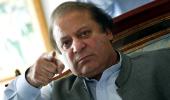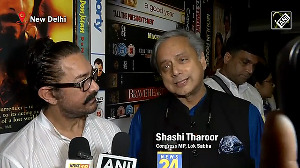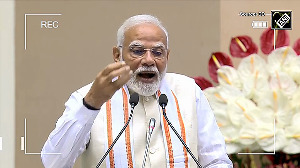The Shahbaz Sharif family (his two wives and their children) invested PkRs 277 crore in 13 companies without having known sources of income.

To what does the new prime minister of Pakistan, Shahbaz Sharif, owe his power?
Undoubtedly, to his political skills. He has, after all, been chief minister of the Punjab province thrice and managed the affairs of the Pakistan Muslim League-Nawaz (PML-N) for several years after brother and former prime minister Nawaz Sharif's exile.
Nawaz Sharif was sentenced to 10 years for corruption and fined $10.6 million after the Panama Papers investigation revealed how three of Nawaz Sharif's children -- Mariam, Hasan, and Husain -- were linked to offshore companies that appeared as owners of four luxury apartments in London.
And that's just a small part of it. The Sharif family's political power has money at its heart: Lots and lots of money.
In 1998, a book came out on the corporate interests of Nawaz Sharif's extended family.
Called Who Owns Pakistan it was written by Shahid ur Rehman, a respected Pakistani journalist who has been covering finance and the economy for more than three decades.
Remember that after Nawaz Sharif became prime minister in the 1990s, Pakistan went through a wave of privatisation and tweaked a number of policies dressed up as economic liberalisation?
Mr Rehman's contention is that most of the moves were made merely to strengthen various industrial houses, including the Sharif family's.
The PML-N government had marked 115 units for privatisation. Of those 67 were privatised by 1997.
The Ittefaq Group holdings belonging to the family of Nawaz Sharif gained the most from these moves, Mr Rehman said.
The Ittefaq Foundry, a relatively modest cast-iron parts business, was established in 1939 by Mian Mohammad Sharif, Nawaz's father, and his six brothers, a family of Kashmiri immigrants who settled in Punjab in the late 19th century.
On migration from Amritsar at the time of Partition, the family settled in Lahore, where Sharif started the iron business, initially on a limited scale and later grew it, even as aristocratic Pakistanis sniffed about the rise and rise of the fortunes of the 'lohars'.
In 1972, Zulfikar Ali Bhutto's government nationalised a lot of private sector businesses, including the Sharif family's.
They then moved their business to West Asia but while Ittefaq's fortunes plummeted (in 1998, according to Mr Rehman, 119 offspring of the founders of the Ittefaq Group were fighting court cases on inheritance and asset division) Nawaz Sharif and Shahbaz quietly worked on their business and grew it.
The steel business continued, but the family also acquired property abroad (in the UK, Saudi Arabia, Dubai, and, of course, Pakistan), agriculture-related concerns like poultry feed (Shahbaz's son Hamza, now chief minister of Punjab, is known as Pakistan's 'Poultry King') and other assets.
The National Accountability Bureau (NAB) is a politically malleable body.
But in 2020, when it was tasked to investigate the Sharifs by Imran Khan, it alleged in the Lahore high court that in 1990, Shahbaz Sharif alone declared assets worth PkRs 21 lakh, which grew to PkRs 732 crore in 2018 in 28 years.
The NAB's affidavit said the Shahbaz family (his two wives and their children) invested PkRs 277 crore in 13 newly established companies under the umbrella of the Sharif group of companies without having known sources of income.
These benami companies, held in the names of retainers of the Sharif family, were used to launder funds amounting to PkRs 240 crore.
Independent assessments made a few years ago by Pakistani journalists suggest the 40-odd members of the extended Sharif family owned a PkRs 4,000-crore business empire.
Nawaz Sharif's personal holdings amounted to PkRs 500 crore-PkRs 1,000 crore. Much of this was illiquid.
The Sharifs still have Saudi assets, established when Nawaz Sharif was in exile.
These include a steel mill amounting to PkRs 700 crore in capital.
The UAE assets -- mills and suchlike -- have been liquidated.
Ramzan Energy is registered on the Karachi Stock Exchange, but is not a full-fledged company yet. It is a bagasse power plant.
Gulshan Carpets was a company allegedly owned by Nawaz Sharif's daughter Mariam, but upon checking it was found to be listed in someone else's name (sounds familiar?).
The income tax the extended family has collectively paid has never gone beyond PkRs 2 crore on average annually for the last several years, affidavits show.
Little wonder then that Mr Khan's campaign to end family rule in Pakistan was so successful and popular.
And he may have stepped down as prime minister. But he and his party, the Pakistan Tehreek-e-Insaf, are still very much around.











